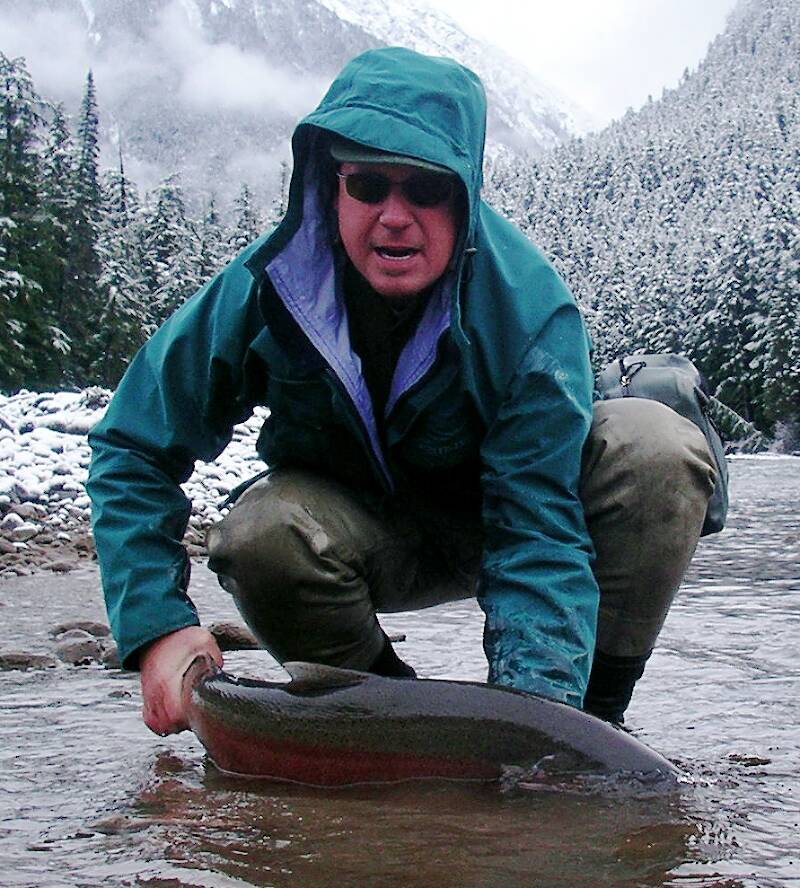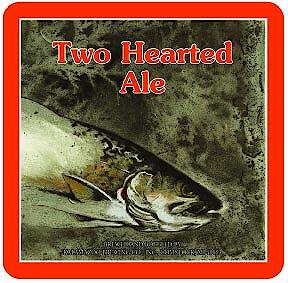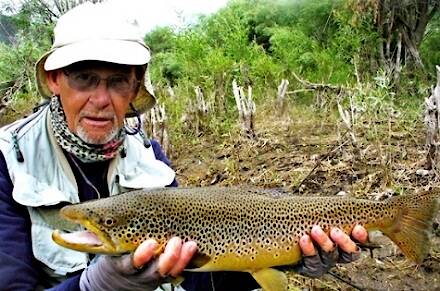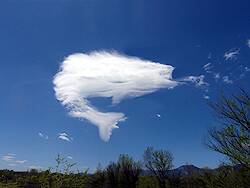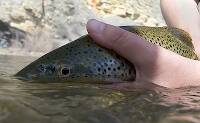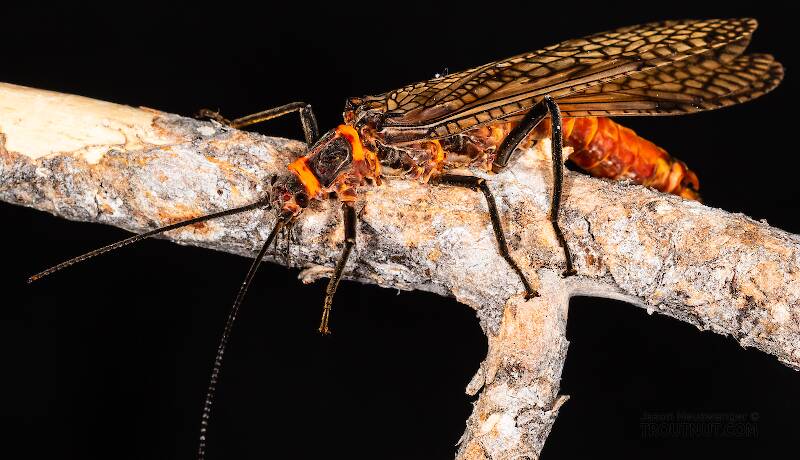
Salmonflies
Pteronarcys californica
The giant Salmonflies of the Western mountains are legendary for their proclivity to elicit consistent dry-fly action and ferocious strikes.
Featured on the forum
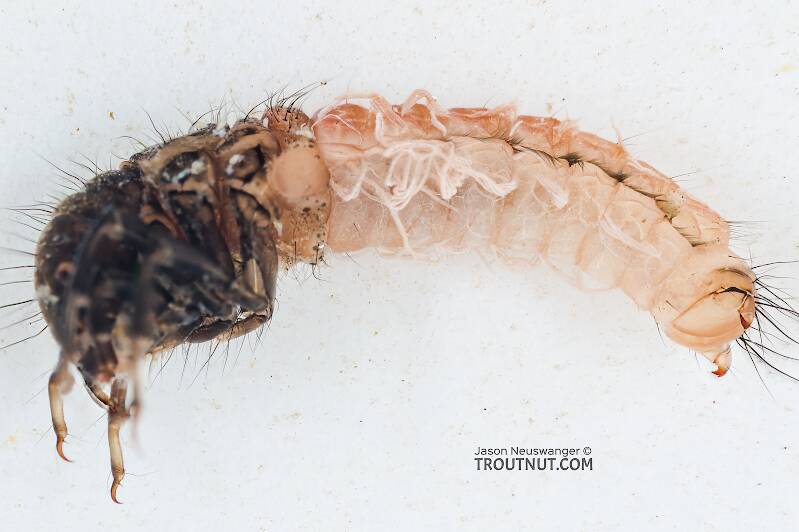
This specimen keys pretty easily to Onocosmoecus, and it closely resembles a specimen from Alaska which caddis expert Dave Ruiter recognized as this genus. As with that specimen, the only species in the genus documented in this area is Onocosmoecus unicolor, but Dave suggested for that specimen that there might be multiple not-yet-distinguished species under the unicolor umbrella and it would be best to stick with the genus-level ID. I'm doing the same for this one.

Troutnut is a project started in 2003 by salmonid ecologist Jason "Troutnut" Neuswanger to help anglers and
fly tyers unabashedly embrace the entomological side of the sport. Learn more about Troutnut or
support the project for an enhanced experience here.
Troutnut on Aug 29, 2006August 29th, 2006, 9:56 am EDT
I was browsing some of the Wikipedia fishing pages today and noticed that PETA has put up links to their despicable Fishing Hurts website, which I won't link to here. It uses fake experts and various other lies to turn people against the sport. It has also distributed a comic targeted at turning kids against their parents who fish, with text along the lines of "daddy's a murderer!"
The vermin had their link on the main fishing page: http://en.wikipedia.org/wiki/Fishing
They had infected several other pages too. I removed all the links I found, but there could be more. PETA's marketers are likely to keep putting the links back up. Anybody can edit the pages on Wikipedia without signing in or anything, so we can stop them by keeping an eye on the pages and making sure we remove the link whenever it's added.
Here's how to do it:
1. Go http://en.wikipedia.org and search for fishing or a fishing-related topic.
2. Look for an "External Links" header at the bottom of the article. If it's there, look for one of PETA's "Fishing Hurts" link under it. If you can't find any of the PETA links, that's great. (I think I wiped them clean... for now.)
3. If you find one of their links, click the "edit this page" tab at the top of the page. There will be a line that looks like this near the bottom:
*[http://www.petasurlhere.com/ Fishing Hurts]
Delete it and click the "Save Page" button below the form. Then walk around wearing a good samaratin smile. :)
The vermin had their link on the main fishing page: http://en.wikipedia.org/wiki/Fishing
They had infected several other pages too. I removed all the links I found, but there could be more. PETA's marketers are likely to keep putting the links back up. Anybody can edit the pages on Wikipedia without signing in or anything, so we can stop them by keeping an eye on the pages and making sure we remove the link whenever it's added.
Here's how to do it:
1. Go http://en.wikipedia.org and search for fishing or a fishing-related topic.
2. Look for an "External Links" header at the bottom of the article. If it's there, look for one of PETA's "Fishing Hurts" link under it. If you can't find any of the PETA links, that's great. (I think I wiped them clean... for now.)
3. If you find one of their links, click the "edit this page" tab at the top of the page. There will be a line that looks like this near the bottom:
*[http://www.petasurlhere.com/ Fishing Hurts]
Delete it and click the "Save Page" button below the form. Then walk around wearing a good samaratin smile. :)
Jason Neuswanger, Ph.D.
Troutnut and salmonid ecologist
Troutnut and salmonid ecologist
Shawnny3 on Sep 20, 2006September 20th, 2006, 2:54 pm EDT
I had an interesting discussion with a colleague of mine a few weeks ago. He's a very strict environmentalist and often questions me about fishing. I stressed to him during our most recent conversation that I practice catch-and-release, expecting him to soften his stance a little. Instead, he said that he had more tolerance for bait-fishermen whose sole intent was to kill fish than for a flyfisherman who injures fish for sport with no intent to kill and eat them. I'd never heard that logic before, but it got me both thinking and shaking my head at the same time. I had no idea what to say...
-Shawn
-Shawn
Jewelry-Quality Artistic Salmon Flies, by Shawn Davis
www.davisflydesigns.com
www.davisflydesigns.com
GONZO on Sep 21, 2006September 21st, 2006, 4:38 am EDT
Shawn-
I have heard that argument, and variations of it, many times. It is a shame when otherwise sincere environmentalists become infected with phoney science and anthropomorphic crap. Bad science makes poor environmentalism. I have even been surprised to see the fly-fishing press rise to bait by saying that we have to be careful not to overemphasize catch-and-release, and that we have to emphasize our option to kill and eat fish or we will lose all justification for our sport! Nonsense.
I have no problem with those who want to kill and eat fish as long as it is done in a way that respects the resource and doesn't break the law; but I'm not about to start killing fish just to respond to the assault from that misguided organization.
I will admit that--like anything--catch-and-release can have its dark side. When fish are routinely mishandled or when greedy fishing pressure amounts to harrassment the ethic is being abused; but don't buy the argument that some high degree of mysterious "hooking mortality" results from properly practiced fly fishing. When fish are efficiently fought and carefully released, the incidence of this is practically nil (provided that you refrain from catching fish when high water temperatures have them prestressed from lack of oxygen).
I will also grant that when we are so dogmatic about releasing fish that we continue to do it to the detriment of threatened native species (like releasing alien brook trout in native bull trout waters, rainbows in greenback cutthroat waters, or smallmouth bass in threatened brook trout streams) we do no service to the species or the resource.
That said, I can certainly understand your bewilderment when your colleague asserted more sympathy with killing fish than injuring them. Oddly, this is where I agree. I, too, have little sympathy for "sports" who truly injure fish for pleasure. But, you need to get your colleague to define "injure." The gist of this misguided argument is that we cause "pain" through the act of (even proper) catch-and-release. Personally, I have no wish to impose pain and suffering on fish, and if I thought that's what I was doing, I'd quit. But pain, as we know it, and the suffering that accompanies it are sensations and emotions of higher animals with more highly developed brains (sometimes, but not always, including humans).
A few years back, Fly Fisherman ran a good article on the science behind the perception of "pain" in fish (I can't remember the exact issue, but perhaps someone else can help). Anyway, you really don't need the article to "justify" things. Your own experience as a fly fisher should reveal the truth. Fish fight the line and pressure from it in a noble effort to escape restraint, not because of pain they are suffering. You have only to observe their response when that pressure is released to recognize this--if the hook were causing pain they would surely continue to struggle. Consider all of the salmon and steelhead swimming in the Salmon River (NY) with hooks of every configuration festooning every part of their bodies (this situation has improved somewhat)--do they behave as though in pain? At most, even this sad abuse is a minor irritant to the fish. Occasionally, you may see a fish attempt to rub a hook against a rock to remove the annoyance, but most behave like any other (undecorated) fish.
In my experience, fish are perfectly willing to cause injury to themselves that far exceeds any that I would willingly cause. I have seen trout rub their noses raw and bloody grubbing for caddis larvae. I have watched rainbows and dollies deliberately endure savage, flesh-rending attacks from spawning salmon just to steal a few eggs--and then eagerly go back for more. And consider what the salmon themselves blithely endure just to spawn. I dare say that if sex was that violent and deadly for our wimpy species we'd have gone extinct long before we ever learned to fly fish!
And finally, I will say that I don't particularly like the heavy mouth-scarring, maxillary-flap-ripping, and outright blinding of beautiful fish that so often results from the current bead-fishing practice in Alaska (and, yes, I do understand the argument that it prevents gluttonous fish from being deeply hooked). But I will also readily confess that this is primarily an aesthetic objection. The fish seem to deal with it far better than I do.
Sorry Shawn, I know this is a rant--but I couldn't resist. I thought I had learned when to keep my mouth shut, but I guess I'll just have to learn that lesson all over again. Damn.
I have heard that argument, and variations of it, many times. It is a shame when otherwise sincere environmentalists become infected with phoney science and anthropomorphic crap. Bad science makes poor environmentalism. I have even been surprised to see the fly-fishing press rise to bait by saying that we have to be careful not to overemphasize catch-and-release, and that we have to emphasize our option to kill and eat fish or we will lose all justification for our sport! Nonsense.
I have no problem with those who want to kill and eat fish as long as it is done in a way that respects the resource and doesn't break the law; but I'm not about to start killing fish just to respond to the assault from that misguided organization.
I will admit that--like anything--catch-and-release can have its dark side. When fish are routinely mishandled or when greedy fishing pressure amounts to harrassment the ethic is being abused; but don't buy the argument that some high degree of mysterious "hooking mortality" results from properly practiced fly fishing. When fish are efficiently fought and carefully released, the incidence of this is practically nil (provided that you refrain from catching fish when high water temperatures have them prestressed from lack of oxygen).
I will also grant that when we are so dogmatic about releasing fish that we continue to do it to the detriment of threatened native species (like releasing alien brook trout in native bull trout waters, rainbows in greenback cutthroat waters, or smallmouth bass in threatened brook trout streams) we do no service to the species or the resource.
That said, I can certainly understand your bewilderment when your colleague asserted more sympathy with killing fish than injuring them. Oddly, this is where I agree. I, too, have little sympathy for "sports" who truly injure fish for pleasure. But, you need to get your colleague to define "injure." The gist of this misguided argument is that we cause "pain" through the act of (even proper) catch-and-release. Personally, I have no wish to impose pain and suffering on fish, and if I thought that's what I was doing, I'd quit. But pain, as we know it, and the suffering that accompanies it are sensations and emotions of higher animals with more highly developed brains (sometimes, but not always, including humans).
A few years back, Fly Fisherman ran a good article on the science behind the perception of "pain" in fish (I can't remember the exact issue, but perhaps someone else can help). Anyway, you really don't need the article to "justify" things. Your own experience as a fly fisher should reveal the truth. Fish fight the line and pressure from it in a noble effort to escape restraint, not because of pain they are suffering. You have only to observe their response when that pressure is released to recognize this--if the hook were causing pain they would surely continue to struggle. Consider all of the salmon and steelhead swimming in the Salmon River (NY) with hooks of every configuration festooning every part of their bodies (this situation has improved somewhat)--do they behave as though in pain? At most, even this sad abuse is a minor irritant to the fish. Occasionally, you may see a fish attempt to rub a hook against a rock to remove the annoyance, but most behave like any other (undecorated) fish.
In my experience, fish are perfectly willing to cause injury to themselves that far exceeds any that I would willingly cause. I have seen trout rub their noses raw and bloody grubbing for caddis larvae. I have watched rainbows and dollies deliberately endure savage, flesh-rending attacks from spawning salmon just to steal a few eggs--and then eagerly go back for more. And consider what the salmon themselves blithely endure just to spawn. I dare say that if sex was that violent and deadly for our wimpy species we'd have gone extinct long before we ever learned to fly fish!
And finally, I will say that I don't particularly like the heavy mouth-scarring, maxillary-flap-ripping, and outright blinding of beautiful fish that so often results from the current bead-fishing practice in Alaska (and, yes, I do understand the argument that it prevents gluttonous fish from being deeply hooked). But I will also readily confess that this is primarily an aesthetic objection. The fish seem to deal with it far better than I do.
Sorry Shawn, I know this is a rant--but I couldn't resist. I thought I had learned when to keep my mouth shut, but I guess I'll just have to learn that lesson all over again. Damn.
Troutnut on Sep 21, 2006September 21st, 2006, 7:22 am EDT
But pain, as we know it, and the suffering that accompanies it are sensations and emotions of higher animals with more highly developed brains (sometimes, but not always, including humans).
Exactly!
I thought I had learned when to keep my mouth shut, but I guess I'll just have to learn that lesson all over again. Damn.
I'm glad you wrote what you did -- I would surely have been in trouble with the lady if I had taken the time to write something so thorough myself. Saying "I agree with Gonzo" is so much easier!
Jason Neuswanger, Ph.D.
Troutnut and salmonid ecologist
Troutnut and salmonid ecologist
Shawnny3 on Oct 11, 2006October 11th, 2006, 12:30 am EDT
Gonzo, thank you for your insightful reply.
-Shawn
-Shawn
Jewelry-Quality Artistic Salmon Flies, by Shawn Davis
www.davisflydesigns.com
www.davisflydesigns.com
GONZO on Oct 11, 2006October 11th, 2006, 7:39 am EDT
You're welcome, Shawn. It would be a surprise, however, if my arguments convinced your colleague. Those influenced by Projecting Emotions Through Anthropomorphism seem pretty impervious to science or reason. That's a shame, because I believe that many have their hearts in the right place--it's just that their heads are somewhere else.
Troutnut on Oct 11, 2006October 11th, 2006, 7:42 am EDT
Projecting Emotions Through Anthropomorphism
That's the best mock PETA acronym I've seen yet!
Jason Neuswanger, Ph.D.
Troutnut and salmonid ecologist
Troutnut and salmonid ecologist
Entoman on Dec 12, 2011December 12th, 2011, 11:00 pm EST
The recent "do fish feel pain" thread caused this one to show up in the Related Topics section from more than 5 years ago. Great stuff, and worth a revisit...
"It's not that I find fishing so important, it's just that I find all other endeavors of Man equally unimportant... And not nearly as much fun!" Robert Traver, Anatomy of a Fisherman
Keystoner on Dec 17, 2011December 17th, 2011, 11:14 pm EST
PETA is a group who's basic ideals I support but who's actual methods are so ass-backward, that they pretty much it impossible to support them in any way. It's a shame because they basically make anyone interested in animal rights look like a bunch of A-holes.
This is something that I often wrestle with. I have often found myself in situations where trout have been placed in water where they (in my opinion) just shouldn't be. Streams that run cold in spring, but will be 85degrees and 3" deep by mid-july. These trout are basically handed a death sentence the minute they're stocked. I often feel like I should kill them just to spare them the slower death which surely awaits them. Most of the time though, I just can't bring myself to do it.
Another situation would be one where trout are the alien or invasive species and the natives would be considered "trash fish." This is a term that I despise, and I don't believe in any fish being "trash". In the name of native fish, I suppose the right move would be to catch and kill the invasive trout as fast as possible. But again, I just can't bring myself to take the life.
Finally, I would recommend that everyone read the book, "An Entirely Synthetic Fish; How Rainbow Trout beguiled America and overran the world." By Ander Halverson A great book that turned a lot of thing that I previously held to be absolute truths directly on their head. A real pulling back of the curtain so to speak.
Considering this example, I would add that I have foul hooked fish and there is NO way to slack the line because they are just pulling so wildly. It's completely different from a fish which is hooked in mouth. Whatever the scientists say, for my two cents I'm not convinced that trout, or fish in general don't feel any pain. Maybe not a pain akin to what we humans feel, but something extremely unpleasant just the same. At least when you've got them in their bodies.
I will also grant that when we are so dogmatic about releasing fish that we continue to do it to the detriment of threatened native species (like releasing alien brook trout in native bull trout waters, rainbows in greenback cutthroat waters, or smallmouth bass in threatened brook trout streams) we do no service to the species or the resource.
This is something that I often wrestle with. I have often found myself in situations where trout have been placed in water where they (in my opinion) just shouldn't be. Streams that run cold in spring, but will be 85degrees and 3" deep by mid-july. These trout are basically handed a death sentence the minute they're stocked. I often feel like I should kill them just to spare them the slower death which surely awaits them. Most of the time though, I just can't bring myself to do it.
Another situation would be one where trout are the alien or invasive species and the natives would be considered "trash fish." This is a term that I despise, and I don't believe in any fish being "trash". In the name of native fish, I suppose the right move would be to catch and kill the invasive trout as fast as possible. But again, I just can't bring myself to take the life.
Finally, I would recommend that everyone read the book, "An Entirely Synthetic Fish; How Rainbow Trout beguiled America and overran the world." By Ander Halverson A great book that turned a lot of thing that I previously held to be absolute truths directly on their head. A real pulling back of the curtain so to speak.
Fish fight the line and pressure from it in a noble effort to escape restraint, not because of pain they are suffering. You have only to observe their response when that pressure is released to recognize this--if the hook were causing pain they would surely continue to struggle.
Considering this example, I would add that I have foul hooked fish and there is NO way to slack the line because they are just pulling so wildly. It's completely different from a fish which is hooked in mouth. Whatever the scientists say, for my two cents I'm not convinced that trout, or fish in general don't feel any pain. Maybe not a pain akin to what we humans feel, but something extremely unpleasant just the same. At least when you've got them in their bodies.
"Out into the cool of the evening, strolls the Pretender. He knows that all his hopes and dreams, begin and end there." -JB
Wbranch on Dec 18, 2011December 18th, 2011, 2:26 am EST
Keystoner wrote;
"Maybe not a pain akin to what we humans feel, but something extremely unpleasant just the same."
If you feel this way aren't you perpetuating that feeling by continuing to fish? If I felt like you say you do I wouldn't be able to enjoy fly fishing because I'd be torn between wanting to have a good time and then wringing my hands about the "something extremely unpleasant" my quarry might be experiencing.
"Maybe not a pain akin to what we humans feel, but something extremely unpleasant just the same."
If you feel this way aren't you perpetuating that feeling by continuing to fish? If I felt like you say you do I wouldn't be able to enjoy fly fishing because I'd be torn between wanting to have a good time and then wringing my hands about the "something extremely unpleasant" my quarry might be experiencing.
Catskill fly fisher for fifty-five years.
PaulRoberts on Dec 18, 2011December 18th, 2011, 6:31 am EST
PETA takes advantage of the ignorant. People's emotions are their cash cow. What is especially troubling is the open encouragement to act, despite the ignorance, resulting in acts of stupidity that can be destructive to the animals and alienating rather than enlightening to the people involved.
Troutnut on Dec 18, 2011December 18th, 2011, 7:12 am EST
PETA is a group who's basic ideals I support but who's actual methods are so ass-backward, that they pretty much it impossible to support them in any way.
I can only agree with the sentiment in their acronym: I'm all for treating animals ethically. In reality, they don't represent the ethical treatment of animals, but extreme, emotional anthropomorphism rooted more in Bambi than in science or ethical philosophy.
Ethical treatment of animals means handling fish properly, killing only what you will use, abiding by the rules of fair chase and taking clean shots while hunting, and generally not causing unnecessary suffering... unless the animal is a mosquito, in which case all bets are off.
Jason Neuswanger, Ph.D.
Troutnut and salmonid ecologist
Troutnut and salmonid ecologist
Keystoner on Dec 18, 2011December 18th, 2011, 11:10 am EST
unless the animal is a mosquito, in which case all bets are off.
Or a tick.
If you feel this way aren't you perpetuating that feeling by continuing to fish?
Yes, I suppose I am. And yes, I do do a fare ammount of hand wringing over it. I don't feel too bad when a fish is caught by the mouth, brought in and released in an apparently healthy condition. I DO however feel horrible when a fish is foul hooked, or seems to be largely worse off because I have caught it. To mitigate this I try to do as much as possible in a "giving back" sense. I check my quarry for the hooks of others (and have removed quite a few), and I ALWAYS pick up trash at the end of a session. I also try to spread out my fishing so as not to disturb too many in any given area.
The bottom line is that I love fishing and fish too much to ever stop. However, I am not as quick as some to absolve myself of the horrors I just might be inflicting. I will say that if a way to "connect" with fish is discovered that does not involve hook & line, my angling days might well be over. But, for the time being I suppose I'll have to settle on methods that are inherintley quite rudimentary, even at they're highest level.
"Out into the cool of the evening, strolls the Pretender. He knows that all his hopes and dreams, begin and end there." -JB
PaulRoberts on Dec 18, 2011December 18th, 2011, 12:46 pm EST
...
I will say that if a way to "connect" with fish is discovered that does not involve hook & line, my angling days might well be over. But, for the time being I suppose I'll have to settle on methods that are inherintley quite rudimentary, even at they're highest level.
A couple thoughts:
-Fish watching, including with polarized glasses, binocs, and through snorkeling and scuba. There are field guides and books available. The more you know, the more fascinating it becomes.
-Research projects. You may be able to hook up with (volunteer with) state fisheries agencies, universities, or museums. And/or you can read up and do your own amateur studies. Research has been the most rewarding connection type experiences I've had, some akin to my consumptive pursuits.
But... for most people, me included, becoming the predator is the most satisfying. I've always had a strong interest in introducing people to the ecology of their landscapes -the best language we have for understanding how it all works. But if I advertised an "Ecology Camp" the respondents were the home-schooled kids, professors kids -namely like teaching to the converted. When I advertised "Fishing Camp", EVERYBODY came. Something about being the predator that motivates people -even if its not thought of in that way.
Quick Reply
Related Discussions
Topic
Replies
Last Reply
10
Sep 1, 2007
by Wiflyfisher
by Wiflyfisher



